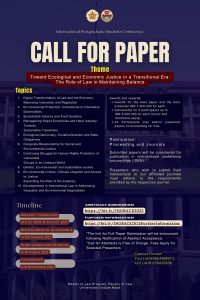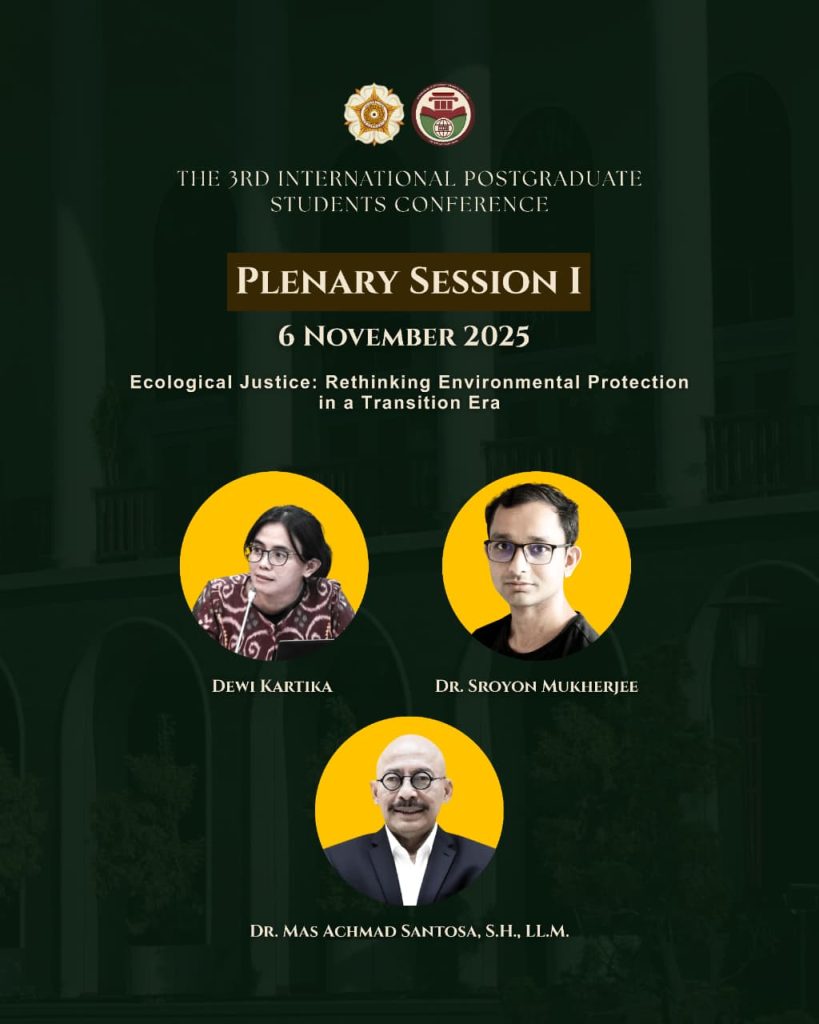Join the international academic conference that brings together postgraduate students from around the world to share ideas, research, and legal solutions for today’s challenges.
Tanya ChatGP

The Faculty of Law, Gadjah Mada University (FH UGM) is one of the oldest and most prestigious legal faculties in Indonesia. Founded in 1946, FH UGM has played a significant role in the history of national legal education, with a strong academic reputation and significant contributions to the development of the Indonesian legal system.
Master of Law Study Program, Faculty of Law, Universitas Gadjah Mada will hold the Third International Postgraduate Students Conference. This conference will take place on 6–8 November 2025 at the Faculty of Law, Universitas Gadjah Mada. The three day conference consists of Plenary Sessions, which will explore the general theme of the conference, and Parallel Sessions, which will be held over the course of two days. Each session is organised in a panel comprising up to four speakers whose abstracts have been accepted for presentation. All papers presented at the conference will be published in the official INGRACE 2025 Proceedings.
The International Postgraduate Students Conference 2025, hosted by the Faculty of Law, Universitas Gadjah Mada, is now open for abstract submissions. This prestigious academic forum invites postgraduate students from around the world to engage in critical discussions and present their research on pressing legal issues concerning ecological and economic justice. The central theme of the conference is “Toward Ecological and Economic Justice in a Transitional Era: The Role of Law i Maintaining Balance.”
Participants are encouraged to explore a range of interdisciplinary topics, including but not limited to: Digital Transformation of Law and the Economy: Balancing Innovation and Regulation; Environmental Protection: Instruments to Internalize Externalities; Sustainable Industry and Food Systems; Reimagining Sharia Economics and Halal Industry: Towards Sustainable Transitions; Ecological Democracy, Constitutionalism and State Obligations; Corporate Responsibility for Social and Environmental Justice; Continuing Struggle for Human Rights Protection of Vulnerable Groups in an Unequal World; Gender, Environmental and Sustainable Justice; Environmental Crimes, Climate Litigation and Access to Justice: Expanding the Role of the Judiciary; and Developments in International Law in Addressing Inequality and Environmental Degradation.
There are numerous benefits for participants. The best paper and best presenter will each receive an award of IDR 1,000,000, and five selected participants will be eligible for scholarships of up to IDR 5,000,000 (terms and conditions apply). Moreover, all selected presenters may publish their papers in the conference proceedings free of charge.
There are numerous benefits for participants. The best paper and best presenter will each receive an award of IDR 1,000,000, and five selected participants will be eligible for scholarships of up to IDR 5,000,000 (terms and conditions apply). Moreover, all selected presenters may publish their papers in the conference proceedings free of charge.
Abstract submission is completely free, with the submission period open from 25 July to 31 August 2025. Accepted abstracts will be announced on 14 September 2025, and the deadline for full paper submission is 15 October 2025. The conference will take place from 6 to 8 November 2025 at the Faculty of Law, Universitas Gadjah Mada.
📞 Vico (+62 896 6398 8927)
📞 Arif (+62 812 5943 2928)

Join the international academic conference that brings together postgraduate students from around the world to share ideas, research, and legal solutions for today’s challenges.







Master of Law Study Program, Faculty of Law, Universitas Gadjah Mada will hold the Third International Postgraduate Students Conference. This conference will take place on 6–8 November 2025 at the Faculty of Law, Universitas Gadjah Mada. The three day conference consists of Plenary Sessions, which will explore the general theme of the conference, and Parallel Sessions, which will be held over the course of two days. Each session is organised in a panel comprising up to four speakers whose abstracts have been accepted for presentation. All papers presented at the conference will be published in the official INGRACE 2025 Proceedings.